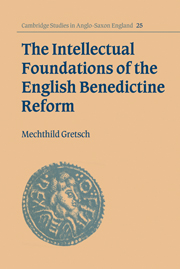Book contents
- Frontmatter
- Contents
- Preface
- List of abbreviations
- 1 Introduction
- 2 Psalters and psalter glosses in Anglo-Saxon England
- 3 The vocabulary of the Royal Psalter
- 4 The Royal Psalter and the Rule: lexical and stylistic links
- 5 The Aldhelm glosses
- 6 Word usage in the Royal Psalter, the Rule and the Aldhelm glosses
- 7 Æthelwold and the Old English Rule
- 8 Æthelwold and the Royal Psalter
- 9 Æthelwold and the Aldhelm glosses
- 10 French and German loan influence
- 11 Conclusion
- Appendix I Æthelwold's life and career
- Appendix II The Royal Psalter at Canterbury
- Appendix III The Gernrode fragments of an Old Saxon psalm commentary
- Bibliography
- Index of Old English words
- Index of Latin words
- General index
7 - Æthelwold and the Old English Rule
Published online by Cambridge University Press: 01 October 2009
- Frontmatter
- Contents
- Preface
- List of abbreviations
- 1 Introduction
- 2 Psalters and psalter glosses in Anglo-Saxon England
- 3 The vocabulary of the Royal Psalter
- 4 The Royal Psalter and the Rule: lexical and stylistic links
- 5 The Aldhelm glosses
- 6 Word usage in the Royal Psalter, the Rule and the Aldhelm glosses
- 7 Æthelwold and the Old English Rule
- 8 Æthelwold and the Royal Psalter
- 9 Æthelwold and the Aldhelm glosses
- 10 French and German loan influence
- 11 Conclusion
- Appendix I Æthelwold's life and career
- Appendix II The Royal Psalter at Canterbury
- Appendix III The Gernrode fragments of an Old Saxon psalm commentary
- Bibliography
- Index of Old English words
- Index of Latin words
- General index
Summary
In our attempt to trace the intellectual home of the Royal Psalter and of the core of the Brussels Aldhelm glosses, our attention has focused thus far on verbal and to some extent on stylistic links between the Old English Benedictine Rule, the Psalter and the Aldhelm glosses. It has also focused on some general principles which seem to have been crucial in the choice or coinage of Old English interpretamenta (such as a taste for words with a ‘hermeneutic’ flavour) and which are shared between the three texts. In a philological study concerned with the origin and authorship of texts, such verbal and stylistic links and shared common principles must be the cornerstones and the conditio sine qua non for any hypothesis assuming for the texts in question an origin either with a single author or within a distinct intellectual group or school. However, philology is not an island. Therefore, philological arguments for a common authorship of any two or more works must bear scrutiny in the light of various kinds of external evidence and must seek confirmation and supplementation by such evidence as may be gleaned from (say) history, liturgiology, palaeography or art history. We may best begin this task by briefly reviewing and reassessing what is known about the authorship and the date of the Old English prose translation of the Regula S. Benedicti, since this is the one text which has been assigned to Bishop Æthelwold for centuries.
- Type
- Chapter
- Information
- The Intellectual Foundations of the English Benedictine Reform , pp. 226 - 260Publisher: Cambridge University PressPrint publication year: 1999
- 1
- Cited by

